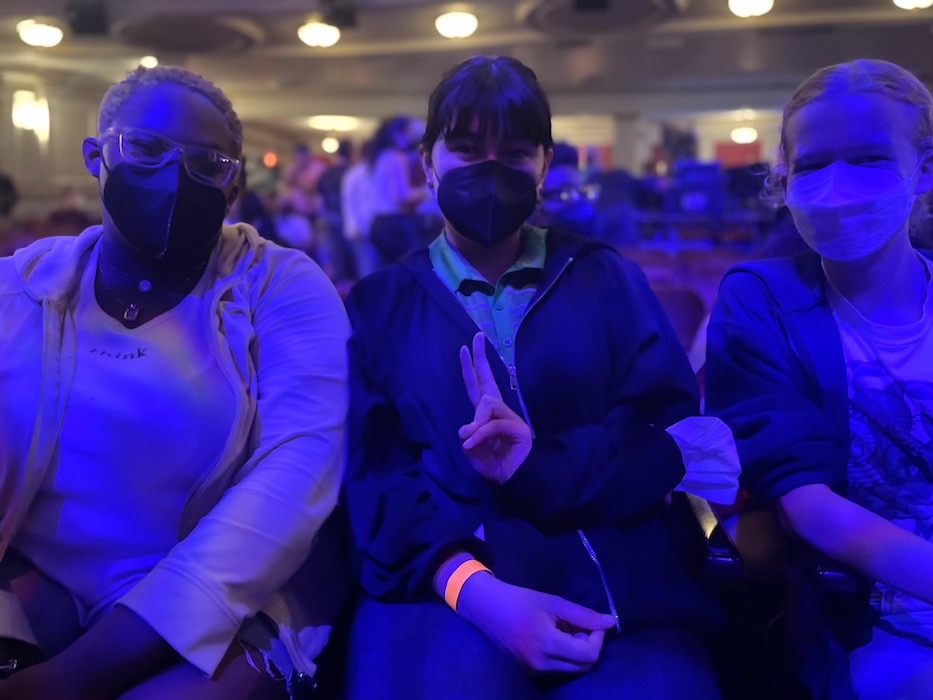
Co-Op High School | Culture & Community | Downtown | Education & Youth | Arts & Culture | Musical Theater | Shubert Theatre
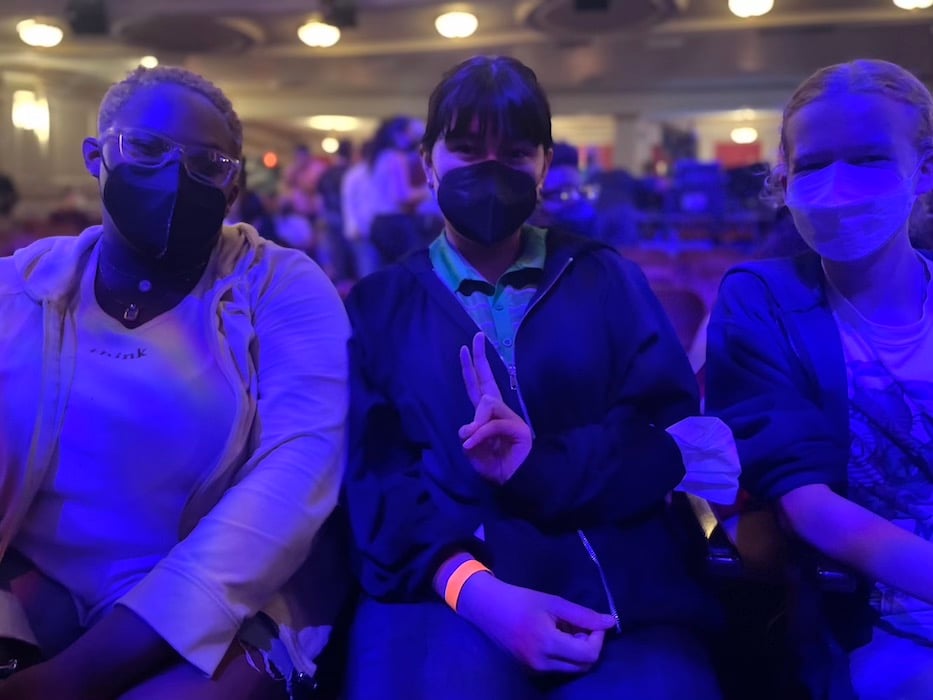
Anniya Taylor-Beam, Yamilet Ramirez Rosas and Matthew Judd. All of them are seniors at Cooperative Arts & Humanities High School. Lucy Gellman Photos.
As purple light scattered across the Shubert Theatre’s stage, Catherine of Aragon (Gerianne Pérez) took it back to the summer of 09—that is, 1509—in style. She looked out into the audience, her curls bouncing off of her rounded, armor-plated sleeves. A crown of gold spikes caught in the light and gleamed. Drums, bass and keyboard swelled beneath her. Her feet flew as she lifted the mic to her mouth.
In the front row, high schooler Anniya Taylor-Beam traveled back in time—and suddenly saw a place for herself in both Tudor history and tech theater.
Pérez is an actor in the national Boleyn tour of SIX, the musical that has traveled from TikTok stardom to the Edinburgh Fringe Festival to to a long-awaited Broadway run and national tour. Taylor-Beam is a senior at Cooperative Arts & Humanities High School (Co-Op), where she studies choir. Last week, their worlds collided at a private dress rehearsal for SIX, the second tour of the show to tech at the Shubert this year.
Teching a show is a process by which producers, crew, and cast test out and finalize every aspect of a performance, from set, lighting, and sound design to last-minute costume tweaks. As it moved into the College Street theater earlier this month, Shubert staff, Co-Op teachers and SIX crew members took it as a rare chance to show high school students how a Broadway show comes together. The show is now in Las Vegas, where it opens its tour Tuesday night.
“Students realize that you can work in the arts and not necessarily be on the mainstage,” said Janie Alexander, who teaches two sections of tech theater across the street at Co-Op. “It gives them a sense of ownership. Yes, you can work in the arts. You have to hustle and you have to be proactive, but you can do this.”
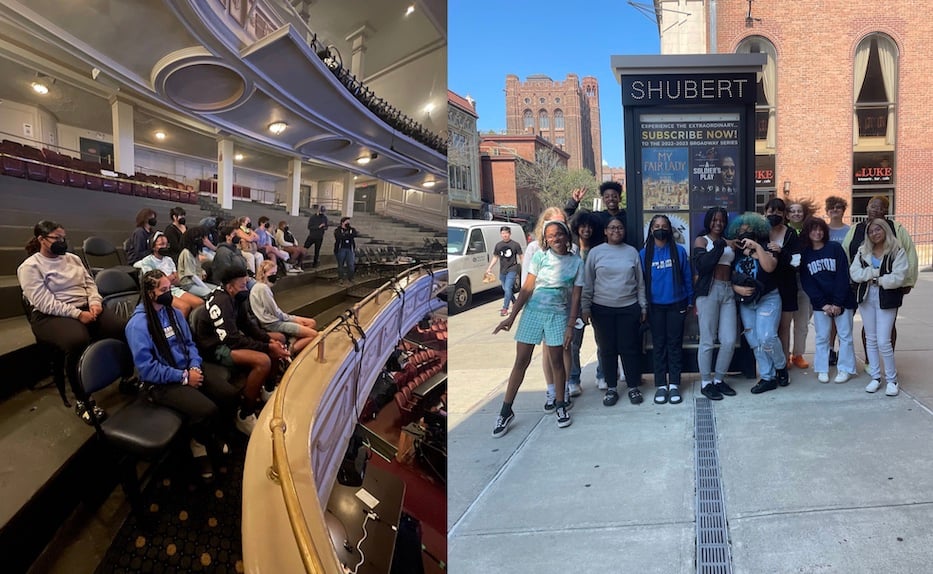
Alexander's tech theater class during a tech talk with Kaitlin Ciccarelli at the Shubert. Janie Alexander Photos.
SIX, for readers who have been living under a rock the size of Windsor Castle, follows the six ex-wives of Henry VIII, who hold a competitive riff-off to determine who had the hardest go of it—and end up tidily, temporarily rewriting history in the process. In order of Henry’s marriages, they include Catherine of Aragon (Pérez), much-maligned former side chick Anne Boleyn (Zen Berube), a soulful and resolute Jane Seymour (Amina Faye), vibrant and funny Anne of Cleves (Terica Marie), the young Katherine Howard (Aline Mayagoitia) and steely Catherine Parr (Sydney Parra).
On stage, four live musicians dubbed “ladies in waiting” make the queendom complete with live bass, guitar, drums, and keys. In other words, it is a musical where screaming YAS QUEEN is fairly appropriate—and happened multiple times during the dress rehearsals last week.
It is the perfect play for high school students, with nods to Beyoncé, Ariana Grande, Katy Perry, Adele, Nicki Minaj, Rhianna and Lizzo that buck and revise the notion that Tudor England was lily white and buttoned up. It is also a technically complex show: hundreds of lighting cues turn the stage into a pop concert, intimate chapel, German rave (we see you, Berghain), elegiac and light-filled chamber, and Tinder-esque game show. There’s live music and near-constant movement on the stage. A confetti cannon turns the end of the show into a party.
“Theater in some ways is a form of construction,” Alexander said, and she wanted her students to see it in action. During the school year, Co-Op students in tech theater work on a performance every two months, from the student creative writing showcase to the fall play to the band concert. At any given moment, one team of students is working on a poster, another is figuring out lighting, and a third reading a script before they step into a given play’s world.
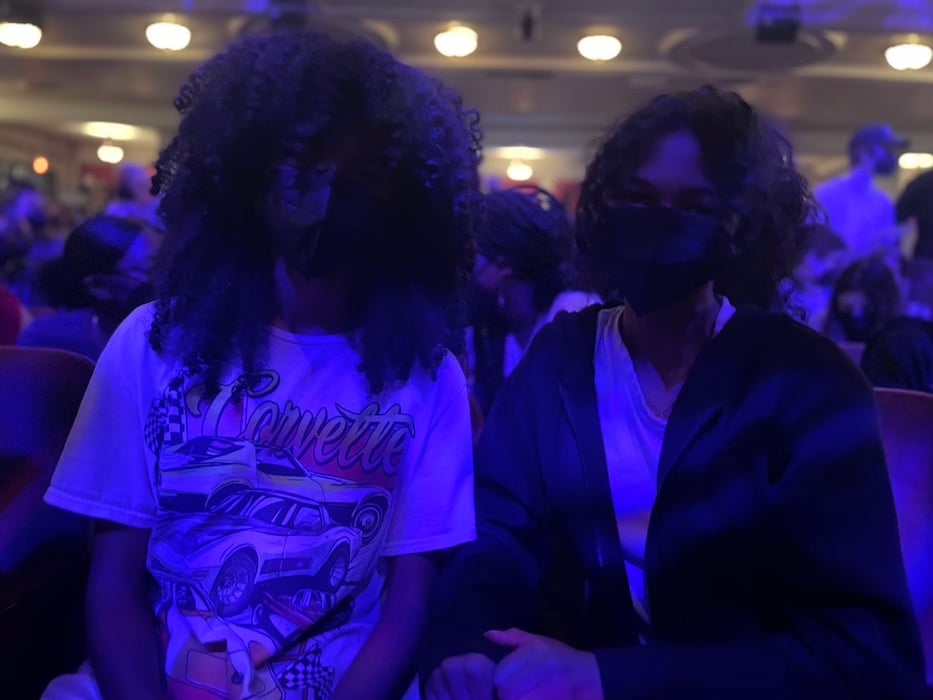
Students Adi Clermont and Kayla Tirozzi. Senior Jaidyn Wein, sitting to their left, did not want to be photographed. Lucy Gellman Photo.
So when she heard that her classes could talk to Kaitlin Ciccarelli, the head carpenter on the show, she jumped at the opportunity. While Alexander’s class is 70 percent young women and she is a female teacher, she’s often hard pressed to find other women in the field, because it’s still dominated by men. As Ciccarelli spoke to students, she said, they listened dutifully, hanging on to each word.
As Ciccarelli chatted to students in the balcony, fellow crew members ran the confetti cannon to see if it worked on the stage below. By the end of the tech talk it had exploded three times, belching a cloud of gold over the stage.
“It's a huge privilege,” said senior Yamilet Ramirez Rosas, who is studying strings. “I didn't know what technical theater was until I took part in this as a class, so I never actually took what they did into consideration. Taking this class has opened my mind into new things."
“It was definitely cool,” chimed in senior Matthew Judd, who is studying choir as his art form, but interested in theater. “My favorite part was hearing how tech theater people … what their careers are like. They talked about it as a lifestyle.”
As lights came down last week, students watched that world come into focus. Cloaked in shadow, six queens introduced themselves one by one, their movements sharp and succinct. As they turned to each other and began to move across the stage, Taylor-Beam’s eyes went wide. At center stage, Faye rocked a black and white striped corset that glowed purple in the stage light. Her sleeves and skirt glittered with black and silver.
It felt like an invitation: students leaned into the music, and let themselves travel somewhere between downtown New Haven and the 16th century. Taylor-Beam later declared the queen her favorite (Terica Marie’s salty Anne of Cleves was a close second) for both her backstory and her performance. For the entirety of the show, she watched as Faye brought a kind of agency, depth and gentle, barbed humor to the role.
“I thought it was really cool,” Taylor-Beam said after the show. “It's good to learn new things. I think it's a really good experience to see what they do behind the scenes, how they do it, and how it works.”
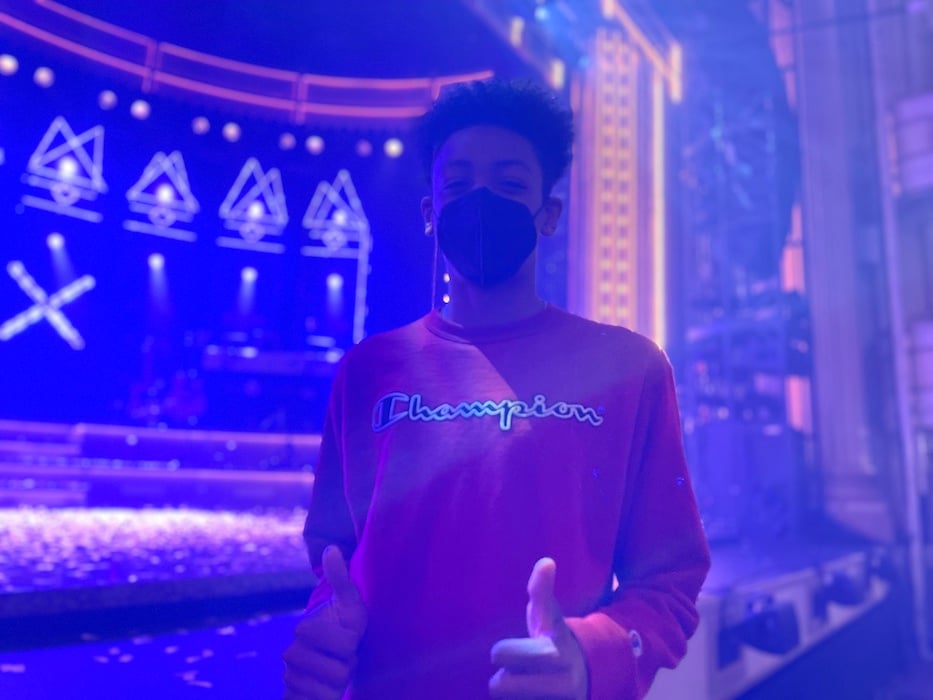
Junior Khalil Antoine. "It's very powerful seeing a whole cast full of women,” he said. “Just seeing that environment around and all of these women doing the thing they love, it's crazy." Lucy Gellman Photo.
On stage, the party was just getting started. With the first mention of Anne Boleyn, the theater's first three rows, reserved for students, burst into cheers. Senior Jaidyn Wein moved to the edge of their seat, trying not to miss a move. They watched as Berube emerged from the pack in a deep, forested green, running through decades of herstory in a single breath.
When the actress jumped into her first chorus—a hook that marries beheading and a very 21st-century non-apology apology—the audience went right there with her. As the song sailed over the audience, Wein took note of that sweet spot, when a play reaches the end of rehearsals and the pieces fall gracefully into place.
"The best moment is when it all comes all together,” they said. “I think after a month or so, two months, three months of hard work, and you see art on the stage, and you can look and say, 'I did that!'"
A longtime tech theater geek, Wein honed their skills last year, working on the tech for Sister Act during their spring semester. Over the summer, they joined Elm Shakespeare to work behind the scenes on performances of The Tempest in Edgewood Park. SIX marked the most ambitious performance they had ever seen, they said—and they were taking mental notes. From the front row, they looked royal themselves, bathed in a soft violet light.
At one end of the second row, student Khalil Antoine also didn’t miss a beat. A junior studying theater, Antoine prefers being onstage—but he’s also interested in learning about tech theater. When Faye flowed into her solo “Heart of Stone,” cutting through the octaves as if they were butter, Antoine watched awestruck before remembering to clap. Cries of “Yesssss!” “Sing it girl!” exploded from around him. At some point, he started to half-dance in his seat, and didn’t stop until actors took their final bows and left the stage. By the finale, everyone in the theater was clapping along.
"It's very powerful seeing a whole cast full of women,” he said. “Just seeing that environment around and all of these women doing the thing they love, it's crazy."
In a phone call after the show, Alexander said that students are taking what they learned back into the classroom at Co-Op as the school rebuilds its tech theater program. In March 2020, Covid-19 hit New Haven just days before Co-Op’s spring musical, shutting down a performance of RENT that some students mourned until they graduated. For over a year, classes remained online.
Now, Alexander said, students are getting back into the swing of things. Watching a musical like SIX has given her students—and faculty—space to wonder whether the school could sustain a similar musical, which pairs ceiling-shattering vocals with an athletic level of dance.
Time For A Tax Credit?
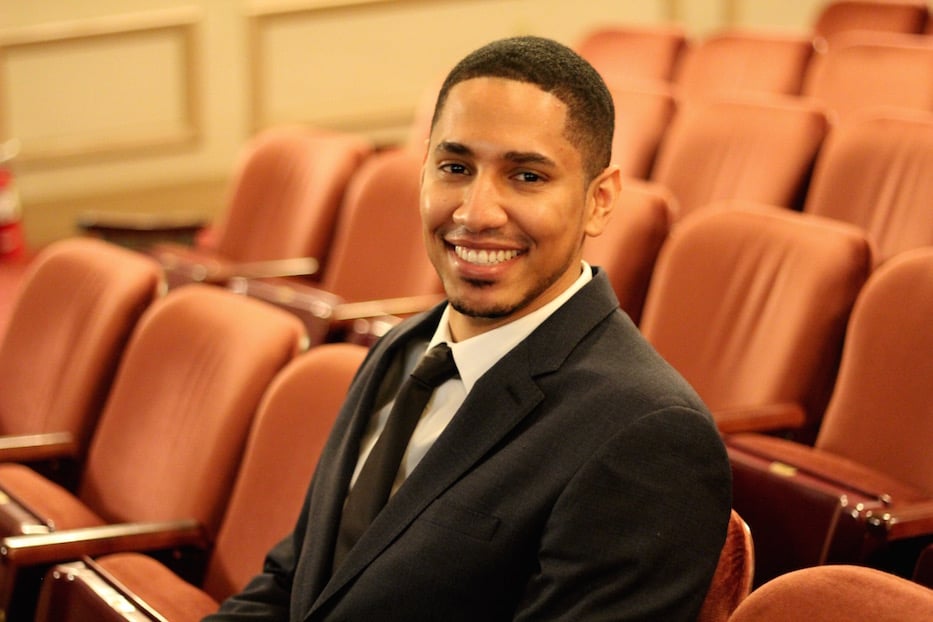
Anthony McDonald in April 2021. He removed his mask only for the photo. Lucy Gellman File Photo.
As the Shubert digs into its educational mission, Executive Director Anthony McDonald is also trying to bring in more chances for hands-on learning like SIX.
In his introductory remarks before last week’s performances, McDonald advocated for the introduction of a musical theater and live performance tax credit in the state, a move that would require a new piece of legislation in the state's upcoming 2023 session. Currently, Connecticut does not have such legislation—meaning that it often loses the chance to tech performances to Rhode Island and New York.
Without a credit in place, "the state of Connecticut is getting kind of left behind," McDonald said. The state does offer a Digital Media and Motion Picture Tax Credit, which only in recent years has faced scrutiny as media jobs leave the state.
He described new tax credit legislation as beneficial not just to the Shubert, but also as a source of economic growth for New Haven and Connecticut. When a show comes to tech, a theater must employ unionized members of the the International Alliance of Theatrical Stagehands Local 74, without whom shows at the theater would not run. Cast and crew members eat at local restaurants, stay at local hotels, park their gear in local garages, and shop at local stores.
In other words, they are part of what made the state’s creative sector a nine billion dollar industry before the Covid-19 pandemic. Over two years after Covid-19 first arrived in Connecticut, the state’s arts economy is still crawling back to that number.
"The state of Connecticut can benefit greatly by having more opportunities like this come to our state," McDonald said. At times, it seemed that he was speaking directly to West Haven State Rep. Treneé McGee, a lifelong theater geek sitting at stage left. "It's not just the Shubert that can benefit. It's all the theaters that do what I do ... we can all benefit from having come to us."
"Our communities benefit the most," he added. "From the hotels to the restaurants, everyone wins."
It dovetails with his larger vision that the Shubert Theatre can be a place for all New Haveners, and attract patrons from across the state. Since he arrived at the Shubert last year, McDonald has pushed for a greater diversity of shows, from Jamaican jazz legend Monty Alexander to classic and contemporary Black dance theater to a summer camp that is still growing a decade in. This fall alone, shows feature not just selections from Broadway, but Rico Monico and Tito Puente Jr., and a showcase of New Haven-based artists. With Shubert staff, he has worked to grow the theater’s relationship in the community—and expand its presence on both a state and national stage.
State Rep. Robyn Porter, who serves on the appropriations committee, said she would be excited to support such a tax credit. For her, the arts represent both an educational platform and a way to heal two years into a pandemic that has hit young people particularly hard. If a tax credit can get more music into the state—and expose more students to that music—she’s for it. She looked to the connection that music has with math and literacy..
“I would absolutely support something like that,” said in an interview at Goffe Street Park Sunday afternoon. “I think that a lot of times, we discount what music really is, what it represents … therapy and restoration. And it also connects people. But I think most importantly is how it aids children in education.”
“I think it’s foundational,” she added. “That’s the other thing we forget. This is foundational. You build community from the ground up.”

